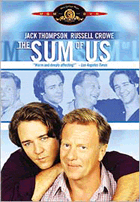

 Independent Gay Writer editor, John
Charles, reviews the film The Sum of Us, made famous in part because of
the later success of actor Russell Crowe.
Independent Gay Writer editor, John
Charles, reviews the film The Sum of Us, made famous in part because of
the later success of actor Russell Crowe.The Sum of Us
Starring Russell Crowe, Jack Thompson, John Polson, and Deborah Kennedy
1994
Running time 100 minutes
Produced in Australia, this is an early Russell Crowe film that’s a portent of his acting and film success. He’s excellent as a young, twenty-something gay man named Jeff, living with his widowed father, Harry, played by Thompson. The film’s underlying theme is love in all its manifestations. Although Jeff’s quest for a solid relationship is the centerpiece for the film, his father’s quest for the same runs parallel to it, and is integral to the story. Jeff meets and likes Greg (Polson). They date and fail to connect; Jeff’s life seems too “domestic” for Greg; Jeff is left disappointed. While Jeff is pursuing and floundering with Greg, his father has met a woman through a dating agency. Harry and Joyce (Kennedy) date, and although sparks don’t fly, they both seem contented. This is challenged when Joyce learns that Jeff is gay. We learn early on in the film that Jeff’s grandmother, Harry’s mother, had a long-term lesbian relationship with her live-in partner, following the death of her husband. It’s into this openly gay-friendly setting that we first find Jeff and Harry.
The film utilizes the method of breaking down the “fourth wall” enabling the characters to speak directly to the camera (and audience). The only two characters who actually do this are Jeff and his father Harry, and while it’s initially a little jolting, one soon becomes accustomed to it; in any event, it’s used judiciously.
Because of the (still) comparative paucity of gay-themed films to compared to mainstream films, one is tempted to call this a “gay movie.” It does, in fact, revolve around Jeff’s quest for love. But the real theme of this film is simply love; love between a man and a woman, between two men, two women, parents and their children. “The Sum of Us” treats homosexuality with seriousness and dignity, while retaining its light, seriocomic feeling. Greg and Jeff’s initial failure to connect is not the final word on the matter. When Harry suffers a debilitating stroke, it becomes a catalyst for them all, in ways that are different for each. “The Sum of Us,” is a satisfying film, a thought-provoking one, and well worth a look.

 And John
also reviews Patricia Nell Warren's The Wild Man...
And John
also reviews Patricia Nell Warren's The Wild Man...Set in late 1960s Spain that is struggling under the yoke of Francisco Franco’s oppressive dictatorship, Patricia Nell Warren has woven a story of relationships, repression, and the human spirit’s yearning to overcome. Author of The Front Runner, the novel that is generally considered THE breakout gay novel that has paved the way for all that have followed, Warren has exceeded herself in many ways with The Wild Man.
Spain, in all her rustic beauty, deep traditions, and centuries-old history of violent repressions perpetrated by the Catholic Church, the throne, and governments that often backed and supported it, the political background of The Wild Man is a vital part of this story. Warren, having lived and worked in Spain during the period that’s depicted in The Wild Man, has imbued the story with nuances only a real understanding of the climate and history of Spain can render.
Antonio Escudero is the "Wild Man." A fading bullfighter in the traditional style, battling an old injury and his own inner conflict, at thirty years old, he is edging towards retirement. Fueled by his crumbling conviction about the meaning of his art, he carries another burden. Living in a country known for its long history of violent racial and ethnic cleansing of Moors, Jews, intellectuals, dissidents and homosexuals, Antonio is a maricón. He is a homosexual. He has dealt with his needs, “the Big Hunger,” by seeking physical pleasures while abroad, and hiding his reluctance to marry in the accepted bachelorhood of the torero. With his confidence shaken from the old injury, with his yearning for a relationship rather than a tryst, and with the pressures to wed placed on him by his family, Antonio is at a crossroads.
As Antonio limps from the ring after a fight at Santander on Spain’s north coast a working-class man, wearing bloodstained coveralls leans out, and offers a drink to Antonio. He is one of the butchers employed to dress the bulls that are killed in the ring. Antonio accepts the drink and moves on. After the fight, as Antonio and his entourage are leaving the arena and getting into their car, a man reappears in the crush of people scrambling for a piece of the toreros. It’s the man who offered Antonio the drink. As the crowd presses in, Antonio’s feet slip, he loses his footing, and the young man, Juan, grabs him. Hidden in the mob of screaming people, Antonio feels Juan press his hips against him and the unmistakable hardness in his pants. As Antonio jumps into his car, he pulls Juan in after him so that he won’t be arrested by ‘the Grays,’ Franco’s police, there to squelch the mob’s enthusiasm for the fights that could, at any time, erupt into a political riot. Antonio thanks Juan and offers him money. Juan proudly refuses. Juan is driven to a safe place, dropped off, and vanishes into the night. Thus, do Juan and Antonio first meet.
Over the course of the next days and weeks, Antonio’s obsession with the man he saw, overwhelms him. Under the pressures from within and those from without, he risks his twin sister Josefina’s trust. Called José, she and Antonio have always been close, and are both viewed unfavorably by their family. Each in their own way, they rebelled against the old traditions. They are an upper-class family, and Antonio’s choice to become a torero was not well received. José did the unthinkable when she moved, unmarried and alone to Madrid, and got a job as a journalist, reporting on the Bullfights. When Antonio breaks down and shares the secret of his homosexuality and his obsession with a stranger he saw briefly in Santander, José shares a secret of her own. She, too, is a maricona. She, however, is not without a secret love in her life. Her long-time lover is Antonio’s soon-to-be fiancé, Serafita, a friend of his sister’s long before she ever met Antonio.
The story follows Juan and Antonio as they fumble through misunderstandings and false starts. Throughout all are Juan’s deep pride and his angry refusal to be bought by Antonio’s wealth and status. Antonio and Juan share a love of their native land, of the flora and fauna, and this provides them a mutual meeting ground, and indeed, a way to secretly fulfill their desire. Paralleling, and closely tied to their story, is José’s and Sera’s. In time, the four come to an agreement, a pact: two marriages of convenience. Before this can be brought to fruition, events unfold that threaten not only their shared dream to live as they need, but their lives as well. In Franco’s Spain, torture and death for maricones is a real possibility. Underlying the main plot and intertwined throughout is a subplot of an Old Spanish relic of archeological value. This becomes a vital element in the events as they unfold.
The Wild Man is first and foremost a beautifully written story of love. The characters are fully drawn, fully realized, and well crafted. Warren paints Spain with brushstrokes both honest and loving, portraying a place that is both physically beautiful and at times, brutally cruel. The subtleties of the political currents and old Spanish traditions, set against the human spirit’s striving for fulfillment, is moving and tragic, horrific and hopeful, yet ultimately a story of promise and optimism. Indeed, with long strides, Spain today has overtaken the United States in tolerance and basic human rights for gays.
The Wild Man is an absolute work of art, a true masterpiece of gay fiction, or rather, simply, of fiction, set in heady and intoxicating Spain, whose passions are revealed at times, not only in what she proudly displays, but also in what she once tried to hide.